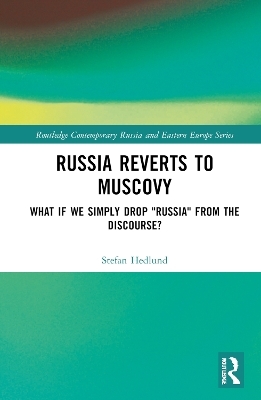
Russia Reverts to Muscovy
What if We Simply Drop "Russia" from the Discourse?
Seiten
2025
Routledge (Verlag)
978-1-032-62767-0 (ISBN)
Routledge (Verlag)
978-1-032-62767-0 (ISBN)
This book explores the implications of removing the notion of “Russia” from political and scholarly discourse. It will be of interest to researchers in International Relations, Ethnic Studies, Political Science, Central Asian, Russian and Soviet Politics.
Russia Reverts to Muscovy explores the implications of removing the notion of “Russia” from political and scholarly discourse.
The book posits the following questions: Should the state ruled from Moscow be termed “Russia”? Might not “Muscovy” be more appropriate? It reflects on how academia has conceptualized developments among the Eastern Slavs over the centuries from the early days of Muscovy up until the present-day Russian Federation with the result that by consistently viewing events through a Moscow lens the West has been instrumental in supporting Muscovite claims to hegemony and thus in allowing Moscow to play an outsized role not only in the region but also in global geopolitics. This book highlights the more recent developments of the Muscovite state, and the increasingly hollow nature of the claims of the Russian Federation to represent all of Russia.
Exploring how the Eastern Slav world could be conceptualized differently and how this world might develop in reality, this book will be of interest to researchers in International Relations, Ethnic Studies, Political Science, and Central Asian, Russian and Soviet Politics.
Russia Reverts to Muscovy explores the implications of removing the notion of “Russia” from political and scholarly discourse.
The book posits the following questions: Should the state ruled from Moscow be termed “Russia”? Might not “Muscovy” be more appropriate? It reflects on how academia has conceptualized developments among the Eastern Slavs over the centuries from the early days of Muscovy up until the present-day Russian Federation with the result that by consistently viewing events through a Moscow lens the West has been instrumental in supporting Muscovite claims to hegemony and thus in allowing Moscow to play an outsized role not only in the region but also in global geopolitics. This book highlights the more recent developments of the Muscovite state, and the increasingly hollow nature of the claims of the Russian Federation to represent all of Russia.
Exploring how the Eastern Slav world could be conceptualized differently and how this world might develop in reality, this book will be of interest to researchers in International Relations, Ethnic Studies, Political Science, and Central Asian, Russian and Soviet Politics.
Stefan Hedlund is Senior Professor of Russian and East European Studies at Uppsala University, Sweden.
Preface; 1. Why it Matters; 2. The Mythology of Muscovite Supremacy; 3. Muscovite State Building; 4. Resilience of the Muscovite Institutions; 5. Why Social Science Fails to Get it; 6. Outlook for Muscovy 2.0; 7. Coda – Final Reflections; References; Index
| Erscheinungsdatum | 24.12.2024 |
|---|---|
| Reihe/Serie | Routledge Contemporary Russia and Eastern Europe Series |
| Verlagsort | London |
| Sprache | englisch |
| Maße | 156 x 234 mm |
| Gewicht | 460 g |
| Themenwelt | Geisteswissenschaften ► Geschichte ► Regional- / Ländergeschichte |
| Sozialwissenschaften ► Politik / Verwaltung | |
| Sozialwissenschaften ► Soziologie ► Spezielle Soziologien | |
| ISBN-10 | 1-032-62767-0 / 1032627670 |
| ISBN-13 | 978-1-032-62767-0 / 9781032627670 |
| Zustand | Neuware |
| Informationen gemäß Produktsicherheitsverordnung (GPSR) | |
| Haben Sie eine Frage zum Produkt? |
Mehr entdecken
aus dem Bereich
aus dem Bereich
Erinnerungen
Buch | Softcover (2024)
Pantheon (Verlag)
16,00 €
Universalgelehrter, Polarreisender, Entdecker
Buch | Hardcover (2024)
mareverlag
28,00 €


